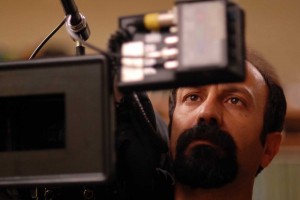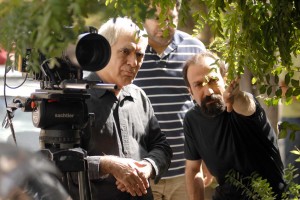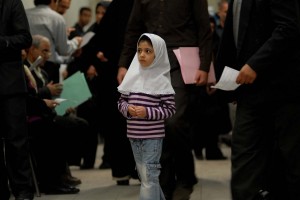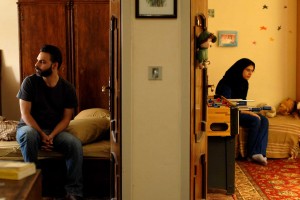
“A detective story without any detectives,” is the way director Asghar Farhadi describes A Separation. (He also produced the film and wrote the screenplay). “The audience is the one in charge of solving the puzzles, and there will be as many answers as audiences.” At a time when Iran and the United States are in an eyeball-to-eyeball confrontation over that country’s nuclear program, A Separation is determinedly non-political and it also avoids pushing hot buttons that would upset its delicate equilibrium.
The film, a Sony Classics release, had already received numerous plaudits before it was recently nominated for two Oscars – for best foreign language film and for best original screenplay by Farhadi. It won the Golden Globes best foreign language film award, and was similarly honored by numerous critics groups including the New York Film Critics Circle and the National Board of Review.
A Separation was also the No. 1 choice for best film of the year – not just best foreign film – by leading critics Roger Ebert and the Wall Street Journal’s Joe Morgenstern. It won the Golden Bear for best film at the Berlin International Film Festival and two Silver Bears for the acting ensembles. It won five awards, equivalent to Iran’s Oscars, at the Fajr film festival including ones for best director and best cinematography.

Iran has a thriving film industry and movie infrastructure, centered mainly in Tehran. “About 100 feature films are made each year in Iran, and great number of people work in the film industry, and some very able crew members can be found,” notes the director. “So it wasn’t very difficult for me to put together a team. Many of the people I worked with on this film I had collaborated with on previous films. I consider them the best at doing their job in Iran, but there are also many other capable people.”
However, for Farhadi it was the first time he teamed with Mahmood Kalari, one of Iran’s most esteemed directors of photography, with credits on over 60 films. “He was a very famous photographer, who then became a DP and has worked on some major films,” says the director. “I knew about his great work but we never had a chance to work together. He has since become my very best friend.” (Kalari won the Silver Frog for A Separation at Camerimage, the world’s leading festival for cinematographers).
The aim of the cinematography and other aspects of the production was to be neutral and not to draw attention to itself. “We were constantly on the lookout not to show off in the film, not to be visible, not to draw the viewer’s attention to our work,” the director explains. “All of us believed that we should make the film as if we were working on a documentary. The entire team felt we should not move closer to one character than another. I wished for a viewer watching this film to think it wasn’t written, that the dialogues were improvised.”

The film was made on location. The couple’s home was a Tehran apartment that was thoroughly rebuilt, with walls knocked out and others put up, then the abode was dressed by production designer Keyvan Moghadam. The government offices and the hospital were sets created in two old high schools.
Moghadam was also the film’s costume designer. “The couple wears modern western dress, reflecting the urban middle class in Tehran,” the director notes. “In most respects they resemble people here, the way they dress, the car they drive.” Many characters also wear more traditional outfits with head coverings for the women. “There also subtleties in costumes that only the Iranian viewer would understand,” says Farhadi. “At the very end all the women are clad in black, which indicates that the grandfather suffering from Alzheimer’s has died.”

The stars of the film, Leila Hatami who plays Simin the husband and Peyman Moadi who is the wife, are well-known actors in Iran. Sarina Farhadi, the director’s 13-year-old daughter, meanwhile, plays Termeh, the bespectacled youngster who is a pivotal character. Caught in the middle she must decide whether to go with her mother or stay with her father – the moviegoer is left at the end to speculate on her choice. A Separation is her third film. ”I told her how much American audiences connected with the part she plays and she was very pleased,” declares the director.
Though Farhadi lives in Tehran, his next project is in Paris on a film with prize-winning playwright Yasmina Reza. She is known for writing “Art” and “God of Carnage” which won the Tony Award for best play and was turned into the film Carnage released last year.





